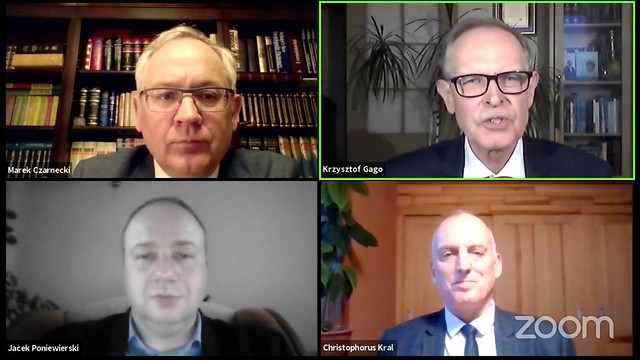Warsaw, Poland—The topic of UPF-Poland’s first national webinar was the reunification of North and South Korea.
Approximately 25 participants joined the online conference on April 16, 2021, which was titled "What Lessons Can We Learn from the Fall of the Iron Curtain for the Unification of North and South Korea?"
The moderator was Krzysztof Gago, secretary general of UPF-Poland.
Speakers:
Dr. Marek Czarnecki, a member of the European Parliament (2004 to 2009) and chairman of the South Asia Peace Forum in the European Parliament
Jacek Poniewierski, a political scientist, graduate of the University of Warsaw
Christoph Kral of UPF-Poland.
Dr. Marek Czarnecki referred to the incredible development that South Korea has experienced in the past decades. He said that a “unified Korea” would have the potential to advance to third place among economic powers within a few years.
The young generation of South Koreans have a rather skeptical attitude toward the unification of their homeland, he said. However, Dr. Czarnecki recalled that when the Berlin Wall came down more than 30 years ago, none of his professors would have dared to imagine that the Iron Curtain would crumble. He said that the same unexpected situation could happen with the reunification of North and South Korea.
Jacek Poniewierski spoke with empathy about North Korea. He said that after the Korean War, Poland expressed empathy by hosting 1,500 orphans.
He suggested that putting pressure on North Korea with severe sanctions might not be the best strategy. He said that trying to force that country to negotiations by making it nearly impossible to maintain its economy was questionable.
Mr. Poniewierski said the Western world has a moral responsibility to find better ways of supporting the reunification of North and South Korea. He spoke about the great potential for the world to learn from the nearly 5,000 years of Korean history and culture.
Christoph Kral of UPF said that for successful negotiations, both parties have to be put on the same level. We can find this respect toward both Koreas by looking at their long common history and values, he said.
After the fall of the Iron Curtain, nations like Poland realized that they did not want to adopt completely the model of secularized democracies of Western Europe; rather they wished to maintain their national culture and values. Similarly, a possible unification of the two Koreas may not mean adopting the democratic systems of the United States or Western Europe; rather, their own historical values and traditions could serve as a foundation for unification.
Mr. Gago gave a presentation about UPF and especially about the founders. Already in 1985, Rev. Dr. Sun Myung Moon predicted the fall of the Soviet empire, which was at that moment quite unbelievable. Mr. Gago said that the 1990 meeting in Moscow of Rev. and Mrs. Moon with Soviet leader Mikhail Gorbachev was the foundation for them to meet North Korean leader Kim Il-sung in Pyongyang in 1991. Today Dr. Hak Ja Han Moon is predicting the unification of North and South Korea within the next few years. As Reverend Moon’s statement in 1985 became a reality, the unification of Korea also will come true, Mr. Gago said.
The feedback to this webinar was positive, and the speakers said they would like to participate in further webinars and discussions.

